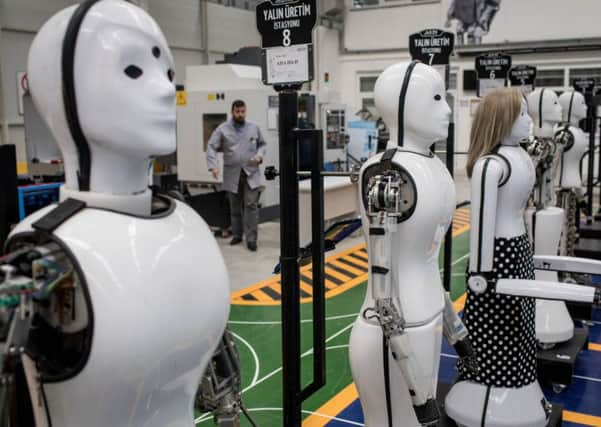Mark Dames: Scotland must embrace robots, not fear them


On a global level, much thought is being applied to ensure it does not develop with a sole focus on technological progress and economic benefit, without considering the impact on workers and society at large. But what do we know about what’s happening in Scotland and what are we doing to prepare ourselves?
BT Scotland, the Scottish Council for Development and Industry, the Royal Society of Edinburgh and trade association ScotlandIS attempt to address this question in a report: Automatic ... For the People? How Scotland can harness the technologies of the Fourth Industrial Revolution to increase economic and social prosperity. The report calls for a strategy for Scotland. It welcomes the plans for artificial intelligence (AI), data and digitalisation in the UK’s Industrial Strategy and the Scottish Government’s Programme for Government, but concludes there is a need for a strategy addressing technology, alongside economic and social dimensions, as is being adopted in frontrunner countries such as Germany and Finland.
Advertisement
Hide AdAdvertisement
Hide AdAll areas of Scotland will require a ‘fit for the Fourth’ infrastructure. This means not only deploying the next generation of digital networks, but also integrating the technologies of the Fourth Industrial Revolution in all infrastructure. Smart tools, including sensors, the ‘Internet of Things’, data and robotics, can improve the performance of infrastructure, better match supply and demand, and inform the design of new infrastructure.
Glasgow is already making use of a new Internet of Things network it has developed, with a trial of sensors on wheelie bins underway. Instead of emptying bins up to three times a day, the new technology will allow only full bins to be targeted, freeing up staff to focus on areas in greatest need. Meanwhile in Orkney, a trial of 5G mobile technology will focus on farming automation, including the use of drones and sensors, sending real-time information on crops and livestock back to farms.
However, if Scotland is to reap the benefits of the Fourth Industrial Revolution, the country needs to become a truly digital nation, able to adopt new technologies quickly and adapt them for economic and social gain. Our education system will need to shift towards a focus on digital skills from the early years onwards and our workforces will need to continually upskill, so they can respond to highly disruptive marketplaces.
A recent report by PwC estimates that the impact of AI across Scotland’s economy could boost annual GDP by up to £16.7 billion by 2030. AI can transform the productivity and GDP potential of Scotland, but we need to take the necessary steps to invest in the different types of AI technology to realise the potential gains.
Automation will enable more businesses and public-sector organisations to increase productivity and free up staff time to concentrate on more valuable elements of their work. It presents a huge economic opportunity – and one Scotland is increasingly well placed to harness, with our innovative digital technologies companies, world-class computing science research base and skilled technology workforce. The most important thing is to make sure the population embraces it and that everyone has the skills they need to feel included as the world advances. AI is a fundamental tenet of how the world is going to operate, and we need to embrace it.
Mark Dames is head of policy at BT Scotland
